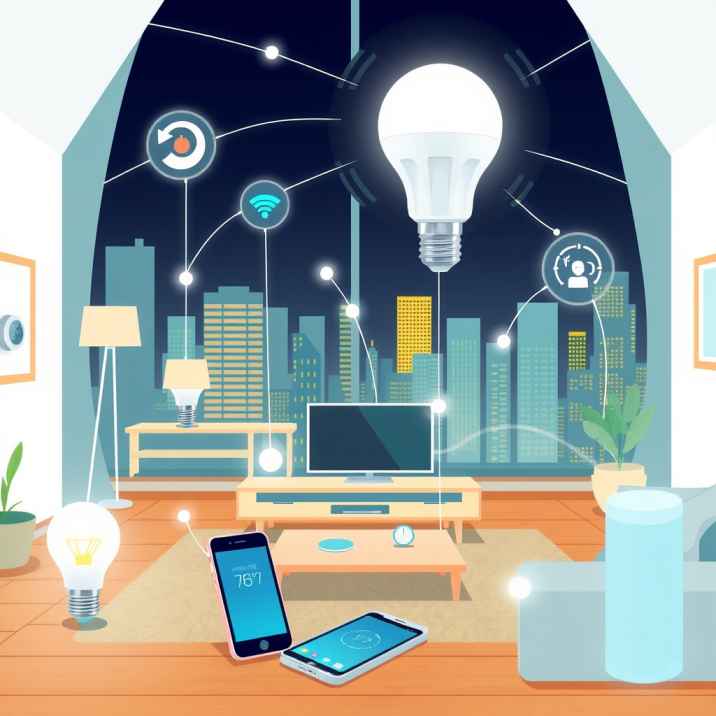
The Internet of Things (IoT) is transforming how we live and work by the past data. By connecting devices to the internet, Internet of Things enables smarter decisions and seamless automation. Let’s dive into what IoT is, its benefits, challenges, and future potential.
What is the Internet of Things?
Internet of Things refers to a network of interconnected devices that communicate and share data across different mediums. These devices range from smart home appliances to industrial sensors dependencies on literacy. Moreover, IoT relies on technologies like cloud computing and AI.
In simple terms, IoT makes everyday objects smarter. For instance, your thermostat can adjust temperatures based on your preferences.
Why is Internet of Things Important Today?
Firstly, IoT improves efficiency in various sectors. In healthcare, wearable devices monitor patients remotely. Additionally, industries use IoT for predictive maintenance, reducing downtime.
Furthermore, Internet of Things enhances convenience. With smart speakers like Amazon Alexa, controlling your home becomes effortless. This technology is reshaping our daily lives significantly.
Applications of Internet of Things Across Industries
Healthcare
IoT devices track vital signs and send alerts to doctors. This ensures timely interventions. Wearables like Fitbit are popular examples.
Agriculture
Farmers use IoT sensors to monitor soil moisture and weather conditions to get good quality and quantity of crops. Consequently, they save water and improve crop yields.
Manufacturing
Factories deploy IoT for real-time monitoring of equipment. This minimizes breakdowns and boosts productivity.
Smart Homes
Smart locks, lights, and cameras enhance security and comfort. Devices connect via apps, offering remote control.
Benefits of Internet of Things as Technology
IoT offers numerous advantages. Firstly, it saves time by automating repetitive tasks and increase the productivity cycle. Secondly, it reduces costs through efficient resource management. Thirdly, it improves decision-making with accurate data insights.
Moreover, IoT fosters innovation. Businesses create new products and services, driving economic growth. These benefits make Internet of Things indispensable in modern life.
Challenges Facing Internet of Things Adoption
Despite its promise, Internet of Things faces hurdles. Security risks are a major concern. Hackers can exploit vulnerabilities in connected devices. Therefore, robust encryption is essential.
Additionally, interoperability issues arise. Devices from different brands may not always work together seamlessly. Standardization efforts aim to address this problem.
Lastly, high implementation costs deter small businesses.
Tips for Getting Started with Internet of Things
If you’re curious about IoT, here’s how to begin:
- Research affordable IoT devices like smart bulbs or plugs.
- Learn about IoT platforms such as AWS IoT or Microsoft Azure.
- Explore online courses on different renowned platforms like Coursera or edX .
- Experiment with DIY kits like Raspberry Pi for hands-on experience.
By taking these steps, you’ll gain practical knowledge quickly.
Frequently Asked Questions About Internet of Things
- What is an example of IoT?
Smart thermostats like Nest are common IoT examples. - How does IoT impact daily life?
It simplifies tasks, enhances safety, and improves convenience. - Is IoT secure?
While advancements are ongoing, ensuring strong passwords helps protect devices. - What industries benefit most from IoT?
Healthcare, agriculture, manufacturing, and retail see significant gains. - Can IoT save money?
Yes, it optimizes resource usage, cutting unnecessary expenses. - What skills are needed for IoT jobs?
Programming, data analysis, and hardware knowledge are key. - How big is the IoT market?
Reports suggest it will exceed $1 trillion by 2026. - Are IoT devices expensive?
Costs vary, but many affordable options exist for beginners. - What’s the future of IoT?
Expect wider adoption and integration with AI and 5G networks. - Where can I learn more?
Websites like IoT Analytics provide valuable insights.
Final Thoughts
To conclude, the Internet of Things is revolutionizing industries and lifestyles alike. Its ability to connect, automate, and analyze makes it a game-changer. As IoT continues to evolve, staying informed and experimenting with its applications will keep you ahead of the curve.
For further information, Contact us OR Pentheblog .
